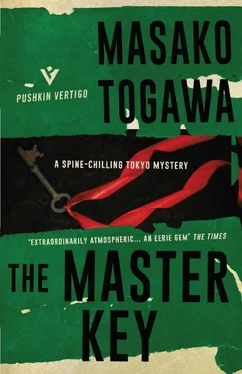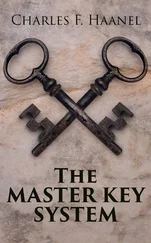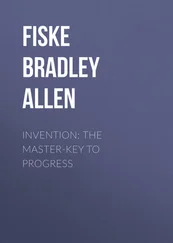Yoneko did her best to console her, but could do so with little conviction.
There was no positive proof that Chikako Ueda had been involved in the kidnapping. It was by no means certain that the words which had issued from the medium’s mouth were George’s. What was undoubted fact was Chikako’s extraordinary reaction to them. And there was also nothing to suggest that the words did not relate to George. Regardless of whether or not the medium had supernatural powers, or had learned of the facts by other means, it remained obvious that a child had been buried and that Chikako was somehow involved.
And the evidence for this went further than Chikako’s behaviour at the seance, for there was also the evidence of the poem Yoneko had found in her room… To a child buried on 29 March … it was too much of a mere coincidence.
Of course, there was no year mentioned. It might have referred to 29 March last year, or ten years before for that matter. George had been kidnapped on 27 March, so there was a difference of two days in the dates. But if any evidence could be found that he had been buried on 29 March, then the poem would be conclusive proof of Chikako’s complicity.
‘If I could be positive that George was dead, then I could at least begin my life all over again.’
Keiko bent low, covering her face with her slim white hands. Looking at her, Yoneko for the first time saw her former pupil revealing her natural maternal instincts.
That night, Keiko stayed in Yoneko’s room. They talked until the small hours. Occasionally they spoke about the past, and what had become of Keiko’s schoolmates, but for most of the time George was the main topic of discussion. Yoneko felt keenly how Keiko had, for the seven years since the kidnapping, lived only in the hope of seeing her son again, and her heart bled for her. She could not but blame the father who had turned his back on the problem and on his wife and had gone home to America alone, but she could also sense how difficult it must have become to continue living with a wife whose only thoughts were for her vanished child.
‘While we were in the waiting room together, George was looking at a comic. When it became his turn to go in, he left it face down on the table, and he was going to finish it later. When he came out from his treatment, he looked for the comic, but a middle-aged American woman was reading it by then. I thought of telling her that my son had been reading it, but felt too shy to do so. Sometimes, when I look back on it, I feel that if he had had that comic to read, he would never have left the waiting room and gone back to the car, and my heart is full of hatred for that white woman.’
Keiko laughed bitterly as she said this, and suddenly Yoneko realised that if she could produce positive and final proof of George’s death it would in the end be for the good of her former pupil. Keiko’s whole life and personality had become distorted by the uncertainty about her child’s fate.
Since the seance, Chikako Ueda had become even more of a recluse, and there seemed no way that anyone could approach her. To get any further in her enquiries, Yoneko realised that she must invent some pretext for talking to Chikako. Even after Keiko went home the next morning, Yoneko spent the day thinking of nothing else.
That evening, when she was just going out to do some shopping, Miss Tojo called out to her from the front office: ‘You forgot to register your overnight visitor, you know.’ Her face was smiling, but behind the mask Yoneko could detect some suspicion about her relationship with Keiko.
‘Perhaps you’d care to fill in the book now?’ She pushed the register across the desk, pointing to a clean page. Yoneko could just discern the traces of writing on the other side.
‘I don’t want to be petty, but it’s always been the rule, you know… We’ve filled in without fail ever since the war ended, and I suppose we’ll go on doing so for another four or five years, even though society has changed.’
And she chatted on in this vein whilst Yoneko registered Keiko’s visit. Suddenly, she had a flash of inspiration. Having entered Keiko’s name and filled in the relationship column—‘friend’—she turned the pages back rapidly until she came to the year 1951. And, just as she had begun to inspect, there was an entry for Chikako Ueda. Ignoring Miss Tojo’s astonished and increasingly loud complaints at this breach of the rules, Yoneko gazed triumphantly at the evidence which lay before her, proof positive of Chikako’s involvement in the kidnapping.
Chikako Ueda was shown as having had a younger female cousin to stay with her between 29 March and 1 April 1951. The name was given as Yasuyo Aoki, aged thirty, unemployed. As George was kidnapped on 27 March, it seemed clear that this ‘female cousin’ was the kidnapper who had brought the child to the apartment block.
‘Oh, I remember,’ Yoneko interrupted Miss Tojo. ‘This was the cousin of Miss Ueda’s who came with a little boy of about four. He must be getting quite big now.’
Miss Tojo thought for a moment, and then replied, ‘No—she was quite alone—I’m sure of that.’ She looked Yoneko straight in the eye as she said this, taking the book back and putting it in the drawer. Yoneko felt that one leg of her hypothesis had been knocked from under her.
She went back to her room and retraced every development since she had received Keiko’s first letter up to this latest discovery in the guest register. She noted down on a sheet of paper those points which she felt to be of most significance:
1. Chikako Ueda had the opportunity of knowing about George from reading her pupil’s essay…
2. She has been awaiting the visit of a man for several years, and always prepares a meal against his coming.
3. She at least knows that a child was buried, and was probably involved in it, too.
Reasons: ( a ) The poem in her room.
( b ) Her reaction to the medium.
4. During the few days immediately following George’s disappearance on 27 March 1951, Chikako Ueda had a female cousin to stay with her.
Having set this all down in black and white, she then examined these facts against the hypothesis that Chikako Ueda was an accomplice in the kidnapping and that the man for whom she had been waiting for so long was the kidnapper. And she suddenly realised that, if this was so, then the young female cousin, the man who had not come back, and the kidnapper were one and the same person. Why had she not stumbled on this obvious fact before? Because she had started off with the false proposition that, because it was strictly forbidden, it was impossible that any male could spend the night in the K Ladies’ apartments. And of course not only Yoneko would fall into this trap—it seemed probable that anyone would.
The kidnapper, either under the pressure of necessity or as part of a prearranged plan, had disguised himself as a woman and passed himself off as Chikako’s cousin and spent two nights with her. Seen in that light, the K apartment block would be the safest hideout imaginable.
The more she thought about it, the more horrified she became. As each clue fell into place, it became clear what had happened. She pictured the course of events and visualised the young man dressed as a woman standing in front of the reception desk, just where she had herself stood only a few minutes before, sheltering behind Chikako’s skirts. Could he have possibly brought George here alive? It would be no easy matter to smuggle in a four-year-old child, to keep him quiet, and so… he had naturally killed him! He had put the body in a rucksack, or suitcase, or some such container, and carried it here. If one was to believe what the medium had said, he had brought him in a suitcase. With what fear of being detected the two of them had climbed the stairs all the way to Chikako’s room on the fifth floor! But where had they buried the child? Unquestionably, somewhere in the building. In the inner courtyard? Under the incinerator, perhaps?
Читать дальше












